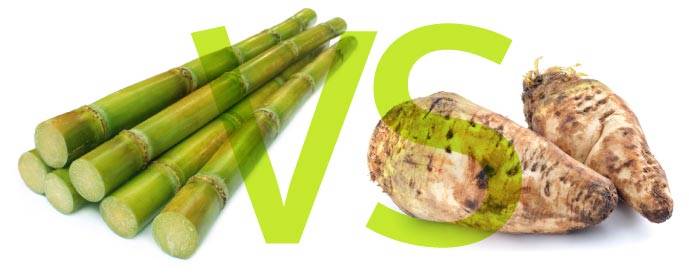Advanced Cane Sugar Processing: Enhancing Performance and Sustainability
Advanced Cane Sugar Processing: Enhancing Performance and Sustainability
Blog Article
An In-depth Introduction of the Health And Wellness and Economic Effects of Cane Sugar Processing on Neighborhood Neighborhoods
Walking cane sugar handling plays a critical role in forming the financial landscape of regional communities, supplying employment opportunities and boosting supplementary industries. The health implications connected with high sugar consumption can not be forgotten, as they contribute to rising prices of weight problems and diabetic issues.
Economic Advantages of Walking Cane Sugar Handling
Walking stick sugar processing offers substantial financial benefits that prolong past the instant agricultural sector. The growing and processing of sugarcane develop various job opportunities, from farming to production and distribution. This work generation not only sustains local economies but likewise cultivates neighborhood development by providing steady income resources for families.
Moreover, the sugar market stimulates secondary companies, consisting of transportation, tools supply, and packaging solutions (Cane Sugar Processing). As these markets grow, they add to a more durable economic structure, boosting overall community durability. The export capacity of refined cane sugar additionally enhances financial benefits, placing regions as competitive gamers in international markets
Investment in modern processing centers can bring about enhanced efficiency and performance, thereby reducing waste and maximizing resource usage. This change not just benefits the neighborhood economic situation but likewise sustains sustainability initiatives by reducing environmental effects.
In addition, the revenue generated from walking stick sugar handling can be reinvested in regional facilities, education and learning, and health care, advertising alternative area development. On the whole, the financial advantages of walking stick sugar handling are diverse, supplying a foundation for withstanding prosperity in agricultural regions.
Health Threats Related To Sugar Intake
Too much sugar intake postures substantial wellness dangers that necessitate serious interest. High consumption of added sugars, especially from processed foods and beverages, has actually been connected to many health and wellness issues. One of the most pressing concerns is obesity, as sweet diet regimens add to a boosted caloric consumption without providing important nutrients. This excess can bring about metabolic problems, consisting of type 2 diabetes mellitus, which has come to be progressively common in both kids and adults - Cane Sugar Processing.
Moreover, high sugar consumption is connected with cardio illness. Elevated blood sugar degrees can cause insulin resistance, a forerunner to numerous heart-related concerns. In addition, sugar can have damaging effects on dental wellness, causing cavities and periodontal illness, as microorganisms in the mouth prosper on sugar, generating acids that deteriorate tooth enamel.
Moreover, emerging research suggests a prospective link in between high sugar usage and psychological health and wellness conditions, such as depression and anxiousness. As communities face these wellness threats, it ends up being important to promote understanding and urge healthier dietary selections. Resolving sugar consumption is important not only for private health and wellness however additionally for the total wellness of regional neighborhoods, stressing the need for thorough public health and wellness methods.
Environmental Effects of Sugar Production
Regularly ignored in conversations about sugar's ramifications is the considerable ecological influence of sugar production. The farming of sugarcane commonly requires considerable land use, causing logging, loss of biodiversity, and disruption of local communities. The conversion of forests and wetlands into sugar haciendas can lead to habitat damage, threatening many varieties and changing environmental equilibrium.
Furthermore, sugar production is resource-intensive, consuming significant amounts of water for watering. This can cause deficiency of regional water resources, adversely influencing both agricultural methods and neighborhood access to tidy water. Furthermore, the usage of chemical fertilizers and chemicals in sugarcane farming can add to soil deterioration and water pollution, as drainage from these chemicals goes into neighboring rivers and lakes, affecting water life and human wellness.
The environmental footprint encompasses the handling stage, where energy intake and waste generation additional worsen eco-friendly concerns. Air contamination from burning sugarcane areas, together with greenhouse gas discharges, contribute to climate change. As such, the environmental implications of sugar production warrant severe consideration, urging stakeholders to take on even more lasting methods to alleviate these adverse results on regional environments and areas.
Work Development and Community Development
The ecological difficulties posed by sugar manufacturing are frequently reversed by its capacity for economic advantages, particularly in work creation and neighborhood advancement. The walking cane sugar industry acts as a considerable resource of employment in lots of backwoods, offering jobs across various skill levels, from agricultural labor to handling and distribution functions. This employment not only sustains private family members however additionally adds to the overall economic vigor of regional areas.
Furthermore, the establishment of sugar processing facilities promotes supplementary services, such as transport solutions, devices supply, and upkeep companies. As these services prosper, they develop extra tasks and boost regional economic situations. The revenue generated from the sugar industry additionally results in enhanced tax incomes, which can be reinvested right into neighborhood solutions such as framework, education and learning, and healthcare advancement.
Furthermore, the sugar sector typically engages in area development initiatives, such as supporting neighborhood schools and health and wellness programs, thus boosting the lifestyle for residents. By cultivating strong neighborhood ties and promoting financial growth, the walking cane sugar processing market plays an important duty in uplifting local populaces, making it a vital component of sustainable growth strategies in sugar-producing areas.
Balancing Wellness and Economic Growth
In navigating the intricacies of cane sugar processing, an essential challenge lies in stabilizing official website wellness considerations with economic growth. The sugar sector significantly adds to regional economies by producing work, stimulating associated fields, and increasing tax profits. Nonetheless, the wellness effects linked with excessive sugar consumption can result in chronic illness such as excessive weight, diabetes mellitus, and cardio issues, which can concern public health and wellness systems and decrease workforce efficiency.

In addition, regulative structures can play a crucial duty in leading sector practices towards more health-conscious and sustainable strategies. By promoting cooperation in between federal government bodies, health companies, and the sugar industry, neighborhoods can browse the duality of health and economic growth, making sure that the advantages of walking cane sugar handling are equitably shared while focusing on public health.
Final Thought
In verdict, the handling of walking cane sugar offers both substantial economic benefits and noteworthy health and wellness risks for regional neighborhoods. While it cultivates work find more production and boosts local growth, the involved health concerns, especially concerning obesity and diabetes mellitus, necessitate a careful harmonizing act. By advertising accountable consumption and investing in community education and learning and lasting methods, it is possible to make best use of financial benefits while reducing adverse wellness impacts, thus ensuring a much healthier future for regional populaces.
In addition, sugar can have harmful effects on dental health, resulting in dental caries and gum tissue disease, as microorganisms in the mouth prosper on sugar, producing acids that deteriorate tooth enamel.
Attending to sugar consumption is important not only for specific health and wellness but additionally for the general well-being of neighborhood neighborhoods, highlighting the requirement for thorough public health and wellness strategies.
Often overlooked in conversations concerning sugar's ramifications is the substantial environmental effect of sugar manufacturing. The health and wellness effects associated with too much sugar consumption can lead to persistent diseases such as excessive weight, diabetes, and cardio concerns, which can worry public wellness systems and lessen workforce efficiency.

Report this page